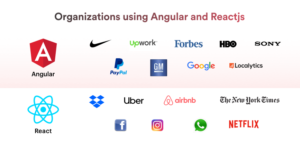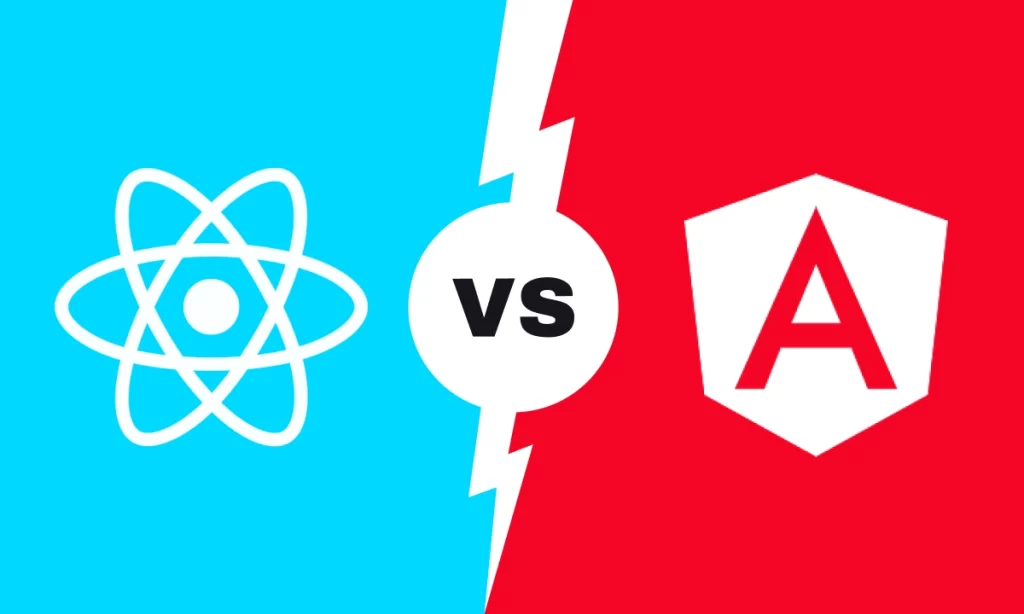Angular and React, as they’re two of the most popular front-end development frameworks. But how can you pick between angular vs react?
Angular: Angular is a Google-developed and maintained web framework that was first released in 2010 under the name AngularJS. It quickly became one of the most popular web frameworks at the time. This was owing to capabilities like two-way data binding and dependency injection, as well as the fact that it was supported by a tech giant.
Angular (also known as Angular 2.0) was released in September 2016 as a complete redesign of AngularJS (Angular 1.0), which was first released in 2010.
React JS: React, a JavaScript library used by Facebook, was open-sourced in 2013. This framework popularised a web development concept known as component-based architecture, which has a number of benefits, including:
Components that are modular and coherent, making them highly reusable and contributing to a faster development time.
It’s used in mobile development since it allows developers to reuse the logical section of an app while simply changing the view.
Easy maintenance and improvement due to self-contained components.
Features:
ParticularsAngularReact JS
| Particular | Angular | React JS |
|---|---|---|
| Founded | Misko Hevery | Jordan Walke |
| Release Year | 2009 | 2016 |
| Ideal for | Create highly active and interactive web application | Large web application and frequently variable data |
| DOM | Real | Virtual |
| App Size | Relatively Small | Relatively Small |
| Performance | Comparatively Low | High |
| Dynamic UI Binding | UI binding at plain object or property level | Direct linking of states to the UI |
| Data Binding | Two way | one way |
| Learning Curve | Steep | Moderate |
| Github Stars | 41878 | 113781 |
| UI Rendering | Considerably less opinionated | Flexible opinionation |
| What should I choose |
|
|

Advantages of Angular
The following are some of the advantages of utilising Angular:
- Clean code development is available.
- Increased Efficiency
- Interface Inspired by Material Design
- Because an angular framework can handle routing, switching from one view to another is simple.
- Angular CLI for Seamless Updates
Disadvantages of Angular
The following are some disadvantages and issues with utilising Angular:
- For newbies, an angular feature can be confuse or may be hard.
- There isn’t a clear manual or comprehensive, all-encompassing documentation.
- The learning curve is steep.
- Limited Routing makes it difficult to debug scopes.
- When pages have interactive components, Angular can become slow.
- Integration with third parties is extremely tough.
- Several complications may arise when upgrading from earlier versions to newer versions.
Advantages of React
The following are some of the advantages of utilising React:
- Because of its straightforward design, it is simple to learn.
- The HTML-like syntax enables for templating as well as extensive documentation.
- Developers can spend less time worrying about framework-specific code and more time writing current JavaScript.
- Improve server-side rendering capability, making it a more robust platform for content-focused apps.
- React allows you to migrate between versions.
- Facebook has a feature called “codemod” that automates a lot of the process.
- React skills can be transferred to Native development.
- ReactJS is ideal for managing huge loads with relative ease when combined with ES6/7.
Disadvantages of React
The following are some of the drawbacks and issues with using React:
- Integrating Reacts with a typical MVC framework like Rail necessitates a lot of setup.
- Users using ReactJS would need a thorough understanding of how to integrate a user interface with the MVC framework.
Conclusion
With so many frameworks to pick from, each with its unique set of characteristics, settling on the best framework can be a difficult task.
We felt the same way when we first opted to build the app in Vue.js and now while we’re exploring Angular.
When it comes to choosing between Angular and React, I believe it comes down to personal preference, as they both tackle the same problems but in different ways.
However, when making a selection, keep in mind that React has a simpler learning curve, which leads to faster development, but Angular offers more built-in functionality.
Both technologies are extremely powerful, a significant advancement from the early days of web programming in terms of improving, facilitating, and speeding up development.
